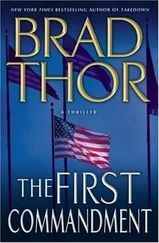“What kind of attack are we talking about?” asked Sebastian.
“Something very big that will happen in several different U.S. cities on the same day.”
“And what is the threat to Germany?”
“There is a remote chance the terrorists may have plans to target the major cities of our allies as well.”
“Do you know who the terrorists are?” asked Herman.
Though he hated to do it, he had to. Harvath looked his friend right in the eye and kept on lying. “No, we have no idea.”
“So,” continued Sebastian, “you are saying that there may or may not be plans to launch a major terrorist action within the Federal Republic of Germany by a group of unknown persons sometime within the next seven days?”
“Yes.”
“Why hasn’t your government shared this information with us?”
“Because it’s highly speculative as to the risk Germany faces.”
“How speculative the risk should be up to us to ascertain.”
“I agree, which is why I am telling you this.”
“In all fairness, you haven’t told us much,” replied Herman.
“You now know what we know. Listen, this whole thing can be derailed if we locate the man I am looking for.”
“Who is he?”
“I can’t say.”
“Can’t say, or won’t say,” queried Sebastian, “because I have to have more than you’ve given me if I am going to authorize any more cooperation.”
Harvath met Sebastian’s gaze and realized he was going to have to give the man something substantial. “His name is Gary Lawlor.”
The three men standing in front of him were stunned.
“The deputy director of the FBI?” asked Herman.
“Former deputy director,” replied Harvath, “He now heads a new division of our Department of Homeland Security called the Office of International Investigative Assistance.”
“What does this office do exactly?”
“Their mission is to help solve and prevent terrorist acts against Americans and American interests both at home and abroad.”
“And your connection here is?”
“Gary Lawlor is my new boss,” said Harvath, hoping that the bone he had thrown them had enough meat on it to make them happy.
“So no more Secret Service?” asked Herman.
“No more Secret Service,” responded Harvath.
“I guess that will have to do for now,” said Sebastian.
“So you’re in?” replied Harvath.
“Yeah, we’re in. Here’s what I am prepared to do. Since we are apparently going to continue without official sanction, I want this contained. If it blows up in our faces, I don’t want to drag my entire team down. I will let the rest of the men go. Max and I will get a hold of the bank and traffic footage-”
“How do you plan on doing that?” asked Harvath.
“I think we’ll let the police do it for us.”
“Won’t they be suspicious of the involvement of two MEK operatives?”
“Not if they think we’re fellow investigators,” said Max as he fished a set of authentic looking credentials out of his pocket that identified him as a special federal investigator.
Sebastian walked over to Max’s BMW and as he opened the door and climbed into the passenger seat, said over his shoulder, “We’ll call you on Herman’s cell phone as soon as we have everything and tell you where to meet us.”
Max followed, slapping the side of the trunk to make sure Heinrich hadn’t fallen asleep and said, “Time to get back to work, Liebling.”
Moments later, all that was left in the parking lot was a pair of tire tracks in the light snow that had begun to accumulate.
“Back inside?” asked Herman.
“No. I’ve got someplace else in mind.”
“Really? I didn’t think you knew Berlin very well.”
“Actually,” responded Harvath, “I don’t. This is a place a friend of mine used to frequent. Let’s get going. I’ll explain in the car.”
AIDATA ISLAND, GULF OF FINLAND
Frank Leighton had called the number from his satellite phone two times more than he probably should have. Nothing was making sense. He was completely isolated. He had had no human confirmation of his assignment at all and that made him even less comfortable than he already was about what he was preparing to do. If his handler failed to make contact, he would have no choice but to assume the worst and put the final plan into action. He would get the device as close as he could to his target, set the timer and run like hell. God, he hoped it wouldn’t come to that.
Once again he heard the words as if they had just been spoken to him, “The protocol is infallible. The protocol will never be wrong.” Frank Leighton had been trained to follow through on his orders and that was exactly what he was going to have to do. Still, if he could just get some sort of confirmation…
There was no choice but to slam the iron door back down on his misgivings and focus his energy on the task at hand. According to his initial readings, the device was still stable even after all these years. Good, that only helped to make his job that much easier. He didn’t want this to turn into a suicide mission.
Leighton used nothing more than the light from a filtered headlamp to illuminate the rocks he was clearing to create a makeshift path down to the beach. Once the slope was clear, he unpacked what could best be described as a child’s wagon on steroids. The lightweight, brushed aluminum cart boasted knobby rubber tires attached to a sophisticated air shock suspension system. Frank Leighton wasn’t leaving anything to chance.
He loaded the wagon with stones, equivalent in weight to the deadly payload he knew he would soon have to transport, and maneuvered it down to the beach where his dinghy was moored. He went back and forth several times, memorizing the terrain, paying close attention to every potential pitfall until he knew it well enough to make the trip with his eyes closed.
His task complete, he disassembled the wagon, covered over its tracks and rowed the dilapidated dinghy back out to the rusting fishing trawler. On board, he brewed a small pot of strong Finnish coffee and prepared a meal of pea soup, rye bread, herring, and pickled cucumbers. His training had taught him that food was a cover just as important as being able to speak the local language. While it might seem strange to the uninitiated, a good operative knew that mankind still relied on its sense of smell, though not nearly as much as other senses. Many Special Forces soldiers in Vietnam were convinced that their ability to elude detection came in part only after they began eating, and thereby smelling, like their enemy. The additional benefit of eating like a local was that should the galley of the trawler ever be searched, it would yield nothing out of the ordinary.
He took his meal to the wheelhouse and listened to the marine radio chatter of lonely Finnish and Russian fishermen plying the cold Baltic Sea. Several men spoke of an approaching storm, and Leighton felt a chill as a gust of wind found its way through a poorly insulated gap between two of the windows. He was glad he didn’t have to be out there tonight, but at the same time, he dreaded how soon he would have to move. He decided to try to make contact one more time.
SOMEWHERE OUTSIDE ZVENIGOROD, RUSSIA
It had taken Milesch Popov two years to find the weapon he now held in his hand. He had been watching an American documentary on modern-day gangsters when he first saw it-the Thompson ZG-51 Pit Bull. The.45-caliber pistol was the rage with all the high-level crime kingpins in East L.A. While lesser wannabe gangsters were running around with their nine millimeters, classy, more self-confident original gangsters were fully strapped with Pit Bulls, complete with a depiction of the notorious dog.
Читать дальше












